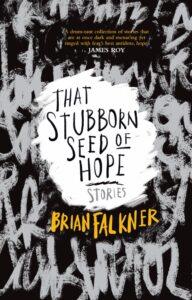Brian Falkner has written many popular and highly acclaimed books for young people. He crosses over genres, styles and age groups. His latest release is a collection of short stories published by UQP. Here he explains for us why the short story format benefits readers.
I love short stories. As a teenager I used to read anthologies of short stories, my favourites being crime, science fiction and horror. Like most writers, I started by writing short stories.
Yet when I became a professional writer, earning my living from my books, it was all novels.
That’s not to say that I didn’t write short stories, I did, but only when an idea was pressing, crying out for a voice.
So along the way I collected a few stories. Some I entered in competitions, others I used as read alouds at festivals and schools. One day I was looking through my stories and I realised that I had almost enough for a collection.
I had always wanted to work with UQP, they produce some of the highest quality publications and best fiction I have seen in Australia, so I was excited when my agent offered the collection to them and they accepted.
Short stories are a completely different animal to novels, not only in the way they are written, but in the way they are devoured. A reluctant reader can pick up a book such as Jack Heath’s 400 minutes of Danger and be immersed in a story that does not feel long (and therefore threatening). By sampling literature in this way, by dipping their toes in the water, they will hopefully discover the joy of reading and gradually extend their reading into longer fiction.
For older readers, even enthusiastic readers such as myself, time can be an issue. If I pick up a 200-page novel I worry that I might start, and not finish. I worry that constraints on my time will mean I read a few chapters, and then it might be a week or two before I am able to get back into it. Longer, if I am in the middle of deadlines. By the time I return to the story, I am no longer immersed in it, living with the characters and breathing the air of their world. Chances are, by the time I have reacquainted myself with the universe of the book, I must let it go again.
A book of short stories offers a short, satisfying read before bed, or in quiet moment. Something that will hook me in, but let me go when I need it to.
Have I achieved this with That Stubborn Seed of Hope?
I can only hope so.
That Stubborn Seed of Hope: Stories by Brian Falkner (UQP, RRP $19.95), out now. Thanks to Brian, for this thoughtful reflection, and thanks to Monica Svarc from UQP for organising this post.





